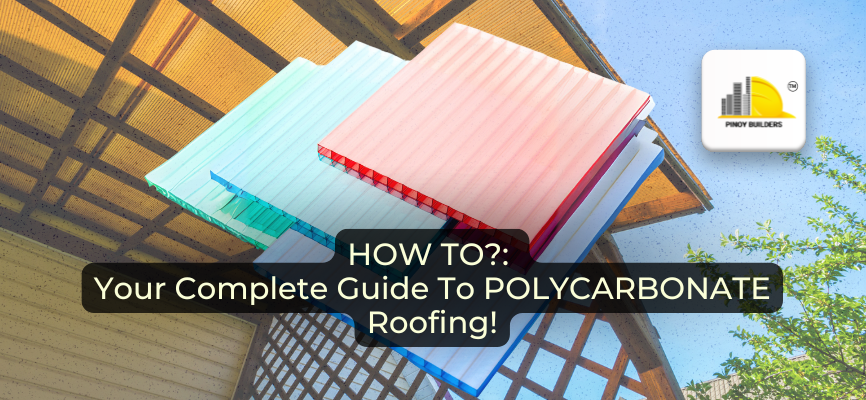Embarking on a roofing project involves well-thought-out decisions and choosing the right material is very important. Essential things to consider in the world of construction are durability, versatility, and aesthetics. Enter polycarbonate roofing—an increasingly popular choice prized for its durability, versatility, and aesthetic appeal.
In this comprehensive guide, we delve into the world of polycarbonate roofing and explore its various benefits, installation intricacies, and maintenance essentials. Whether you’re considering it for a residential patio cover, a greenhouse, or industrial warehouse, understanding its nuances is indeed important. Let’s dive right in!
HOW TO?: Your Complete Guide To POLYCARBONATE Roofing!

Polycarbonate roofing has seen a surge in popularity in recent years due to its versatility, durability, and cost-effectiveness. Not only is it a great alternative to fiberglass roofing, but it is also cheaper and can withstand a lot of environmental factors.
A lightweight thermoplastic material, polycarbonate sheets are still a favored material for roofing due to their high-impact resistance, clarity, and flexibility. Polycarbonate roofing offers numerous advantages such as excellent weather resistance, UV protection, and insulation properties. Before starting your project, it’s important to understand the different types of polycarbonate roofing available and the factors to consider when selecting the right material.
Proper Polycarbonate Sheets Installation
To ensure a smooth installation process, you must gather essential tools for the project. Essential tools may include a saw, drill, and measuring tape, along with safety gear like gloves and safety glasses. Additionally, you’ll need materials such as fasteners and sealants to complete the installation. Note that materials may vary depending on the project.
Before installing polycarbonate roofing, assess the installation area and take accurate measurements. Prepare the surface properly to ensure that it will be safely installed. Proper planning for drainage and ventilation is crucial to prevent water accumulation and preserve adequate airflow, especially in closed spaces.
Follow a step-by-step guide for installing polycarbonate roofing, including preparing the frame, cutting sheets to size, attaching them securely, and sealing edges and joints. Tips for a successful installation and common mistakes to avoid are also highlighted to help DIY builders achieve professional results.
Keeping Your Polycarbonate Roof Clear
Some contractors or seasoned DIY-ers may prefer polycarbonate sheets over fiberglass materials for roof installation. This is because, unlike fiberglass, polycarbonate sheets are not susceptible to yellowing and can maintain their clear color over a long period of time.
Maintaining polycarbonate roofing involves regular cleaning and inspection to prevent debris buildup and address common issues such as condensation and scratches. Implementing a maintenance routine can extend the lifespan of your roofing and preserve its clear appearance.
While polycarbonate roofing offers cost advantages over traditional materials like metal or glass, factors such as sheet thickness and installation complexity can influence overall costs. Budget-friendly installation tips are provided to help DIY builders achieve quality results without overspending.
Practical Solutions: The Power of Polycarbonate Roofing

Polycarbonate roofing is a sustainable option compared to traditional materials. This is because the material can be recycled at the end of its lifespan. Implementing eco-friendly practices during installation and maintenance further reduces its environmental impact and makes it an attractive choice for environmentally-conscious builders.
Compared to fiberglass roofing, polycarbonate roofing offers a practical and durable solution for DIY builders who are seeking to enhance their projects. By following this guide, readers can confidently tackle their roofing projects while reaping the benefits of this versatile material. Consider polycarbonate roofing for your next DIY endeavor and enjoy its long-lasting performance and aesthetic appeal.










